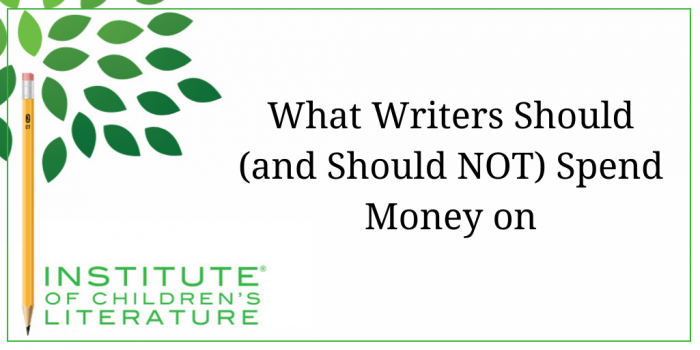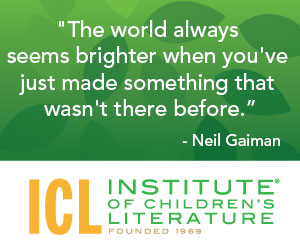1000 N. West Street #1200, Wilmington, DE 19801
© 2024 Direct Learning Systems, Inc. All rights reserved.

Whenever you have a large group of people with a dream and a desperation to fulfill it, you’re also going to see people quick to take advantage of that.

Let’s consider, what kinds of things might a writer spend money on?
One interesting thing about becoming a professional writer is that you really can do it with very little expenditure as long as you’re
• strongly self-motivated,
• good at evaluating research, and
• able to find honest, informed feedback.
Though my college degree is in Journalism, very little of what I learned did much to prepare me for writing novels. And I didn’t have much money, so most of what I learned about writing, I self-taught through a lot of reading, a lot of analyzing what I read, and a lot of trial and error.
Today, I make a decent living as a professional writer. But I began the process of learning to become a professional writer long before that, and no one was going to pay me steady money for the quality of my writing at that point. I had a ton to learn (and still do). Since I couldn’t invest in conferences and instruction, I took the long, long, long road to learning it. But I did get there. It isn’t quick. It isn’t painless. But you can get there.

What do you think you gained from taking a lengthy writing course (either through at-home study with one-on-one instructors like the ICL courses or by traveling to workshops)?
For most of them, they felt they shaved about ten years off the long road of self-instruction. And for some, that ten years really meant the difference between sticking with their dream and abandoning it as a lost cause. Not everyone is as stubborn as I am (or maybe as unwilling to get a day job).
But it is important whenever you’re considering a workshop, or conference, or class, to learn all you can about and read what others say about it. Now, when you’re looking into what others say, I’d look at people who have actually attended the workshop, conference or class. The folks putting it on might be inclined to oversell. The folks who never took it, might be inclined to make guesses about it that aren’t correct. But the people who have sat in the seats and done the work, those people will know what it did for them. And that insight can be very valuable when you’re trying to decide how to spend your “improving my writing” budget wisely.
For many years, whenever anyone asked me about self-publishing, I advised against it. There was a prejudice against it, but attitudes have changed and there are many more options open now. When done successfully (as in done so that you actually sell books and reach an audience): it can be as time-consuming as a full-time job, but if you want to be a writer, it is a business.
Former ICL Director Katie Davis interviewed an “indie writer” for a webinar and the writer revealed she makes over $100,000 annually–but she treats it as her business. The reality is that many people who begin with self-publishing never cross over into commercial publishing, so it needs to be examined as its own thing, not as a “stepping stone” to commercial publishing. It also may be more expensive than you’d think (if done right). And it requires you to take on a lot of jobs or hire people to do those jobs, each of which demand special skills and time. But I also know that there are more and more writers making a good career from self-publishing. So it’s well worth thinking about.

Most of these writers self-publish electronically, and they sell to a market hungry for stories. These are the readers who are constantly reading. And they don’t care who published the book (though they often care about who wrote it); they want a story that it is engaging, exciting, and good. That doesn’t mean you can write a novel in one of those genres and just throw it into the vast ocean of eBooks on Amazon and hope for the best. What will happen is that the book will sink, because no one will know it’s there. So even when writing in one of the “hot” genre, you must do a lot of promotion and know the ins and outs of how to sell on Amazon.
In younger children’s books, electronic publishing works less well. Many, many elementary-aged children simply do not read electronic books. Even the kids who are voracious readers tend to gravitate toward print books. Therefore, if you have an early reader, graphic novel, or series of novels for younger readers, CreateSpace isn’t a bad way to go, since it’s a print-on-demand model, meaning you don’t pay in advance for the printing. And picture books often only see sales in the dozens if published electronically because the whole allure of a picture book is badly diluted when you cut out the tactile input of a “book.”
Some writers have worked around this by self-publishing in bound, print books. This can be really expensive to do, and that expense usually needs to be passed on to the reader. This results in a picture book that costs a lot and tends not to “look” competitive with picture books in bookstores that cost far less. Plus, physical bookstore placement for self-published books is still tough, so most of your sales remain hand-selling to potential readers at events. This takes time–lots of time–time not spent writing or growing as an author. But if you’re very extroverted, it can also be a lot of fun.
So self-publishing can be a great option for those people who (1) are eager to learn and take on (or hire out) all the different, unique roles necessary to put out a competitive book, and (2) are extroverted enough to enjoy the social demands of self-publishing, putting yourself and your book out there and interacting with potential readers.
There are a lot of “services” that have grown up around writing. Some, like agents, are vital to working in specific areas of publishing. Some are simply good ways to extract the cash from your wallet.
Let’s look at agents. How much do they cost? Upfront, they cost nothing. I’m serious. If an agent asks you to write a check upfront to cover “costs” or some other nebulous thing, go find another agent. Yes, I know, it’s hard to turn away from the bird in the hand–that one saying so many nice things about you. But if you write checks to your agent, it’s not a real agent. Plus, you lessen your agent’s need to sell your book in order to pay his/her expenses, and you really want your agent to be motivated to sell your book.

Now, there are still a number of publishers who take submissions from unagented writers, though it is getting harder and harder to build a career in commercial publishing without an agent. But a bad agent really is worse than no agent. Giving money for poor service is a good way to slow down your career and frustrate you. Plus, if your first book bombs (because a poor agent connected you with a poor publisher) then it becomes harder to sell your next book (not impossible, but harder). So, be wise.
Some other services are both less necessary than agents and decidedly less successful. Submission services (which promise to send your proposal or query to dozens of agents or publishers) are rarely successful at connecting you with a reputable, successful agent or publisher. This is because “shot-gunning” the same query or proposal is not a good way to make a sale. You’re asking a publisher to spend many thousands of dollars preparing your book for publication and getting it into the hands of readers, and they’re expecting you to go to the trouble of paying attention to whom you’re pitching and what they’re publishing.
And when shot-gunning agents, the same principle is in play. You’re trying to make a business connection that will cost that agent many hours and involve long-term interaction, so the agent would like it if you acted as if you’re making the choice with thought and care (rather than just shot-gunning everyone with an email address). On top of all this, submission services aren’t cheap, so you’re actually paying money to make it less likely that you’ll connect with an agent or publisher.
Promotion services can be much the same way. Blog tours you set up yourself, for instance, can be a fun way to promote a book through blogs you love with readerships that overlap your potential readers. But blog tours set up by “blog tour companies” tend to involve blogs with limited readership, who often post nothing but blog tour posts (thus making it unlikely they’ll ever have much readership). Other promotion services will shotgun press releases to media (or, even worse, spam people with them based on email lists), and tend to have rather poor results. Author-side promotion that works best tends to begin with the author making very personal connections through real relationships: sharing with clubs and organizations to which you belong, connecting with local bookstores and author events, and personally connecting with local media. People almost always respond better to personal connections than to shot-gunned spam.
So, you need to be wise with your money, but don’t be afraid of possible opportunities. Research them. Ask questions. Watch for any feeling of discomfort at the answers you get. Don’t shrug off any unease, instead use it to energize new questions. Reputable businesses don’t mind well thought out questions (but cheats will nearly always try to make you feel guilty about them.) Then when you’re comfortable and can afford it, step out and do something new for your writing. The time you shave off your journey to publication will be worth it.
With over 100 books in publication, Jan Fields writes both chapter books for children and mystery novels for adults. She’s also known for a variety of experiences teaching writing, from one session SCBWI events to lengthier Highlights Foundation workshops to these blog posts for the Institute of Children’s Literature. As a former ICL instructor, Jan enjoys equipping writers for success in whatever way she can.
1000 N. West Street #1200, Wilmington, DE 19801
© 2024 Direct Learning Systems, Inc. All rights reserved.
1000 N. West Street #1200, Wilmington, DE 19801
© 2024 Direct Learning Systems, Inc. All rights reserved.
1000 N. West Street #1200, Wilmington, DE 19801
© 2024 Direct Learning Systems, Inc. All rights reserved.
1000 N. West Street #1200, Wilmington, DE 19801
© 2024 Direct Learning Systems, Inc. All rights reserved.

1000 N. West Street #1200, Wilmington, DE 19801
© 2025 Direct Learning Systems, Inc. All rights reserved.

1000 N. West Street #1200, Wilmington, DE 19801
©2025 Direct Learning Systems, Inc. All rights reserved. Privacy Policy.
2 Comments